Faith is the divine spark planted in the human soul, igniting our deepest longings and highest aspirations. It is an eternal flame, which cannot be extinguished. No matter how dimly it glimmers, it will survive the worst storm.
When I look into the starry sky or gaze beyond the ocean, I begin to appreciate with a profound sense of awe the farther reaches of faith. Who can fathom the scope and mystery of this divine gift? Faith rides the tidal waves, penetrates the black hole, and grows with the expanding universe. There is no limit to what can be accomplished through faith!
Faith in God can move mountains and divide oceans. It can survive the hottest fire and the biggest waves. It can scale the highest submit and plumb the lowest abyss. It can lift the spirit of an entire nation and transform broken lives. So much rests on such a simple word — faith. Indeed, the survival of humanity depends on it. No other human virtues, no other human strengths can match the genius and audacity of faith.
As I penned the above paragraphs on December 24, 2004, my heart was overflowing with joy and expectations. Sitting in the verandah of a resort in Cancun, Mexico, listening to the cheerful Christmas carols, I celebrated the birth of Baby Jesus. Almost two thousand years ago, the star from the east guided the wise men to the newborn king for a new world order of reconciliation and love.
Little did I know how quickly my song of praise would turn to lamentation! The turning point happened on December 26, the day after Christmas.
A bad omen was in the air. As darkness was gathering on the horizon, the distant deep blue sea turned into purple and black. The winds scowled and the waves roared. From time to time, lightning split the sky asunder. The waves surged ahead and swelled into a high wall of water, before crashing on the beach, kicking up a splash of sand. Then the waves retreated only to come back bigger and stronger. The beach was all but deserted, except for a few brave souls, who were watching the big waves. This would be considered a rather normal scene on the wavy beach of Cancun in a stormy day.
But thousands of miles away in South Asia along the shores of Indian Ocean, what first appeared to be the normal scene unexpectedly turned very abnormal – Without any warning, waves 2-storied high, aggressively invaded the beaches, swallowing up everything in their path.
The Meaning of Tsunami Disaster
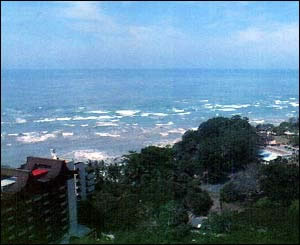 By any measure, the Asian tsunami is a colossal disaster of epic proportions. More than 155,000 people are now known to have perished. The World Health Organization has warned that the death toll could be doubled if clear water and basic services are not provided in a few days to prevent the outbreak of epidemics.
By any measure, the Asian tsunami is a colossal disaster of epic proportions. More than 155,000 people are now known to have perished. The World Health Organization has warned that the death toll could be doubled if clear water and basic services are not provided in a few days to prevent the outbreak of epidemics.
In Banda Aceh of Indonesia, the hardest hit area, one third of the population are dead. The entire city has been obliterated as if by a nuclear blast. Lives and livelihood have been washed away. Streets used to be alive with children and people are all vanished. As far as eyes can reach, all one can see is wreckage, debris, decomposed corpses and sewage like dirty water. The stench of decay hangs heavy in the air.
The city has become a ghost town and a makeshift mass graveyard. The only sign of life is the occasional crying of babes. Are they hungry for their mother’s milk, or are they protesting their fate?
Everywhere along the coastline, the scope of devastation is something the world has never witnessed in recent memory. Everyone in the global community is affected, because technology has brought real-time suffering in far-flung areas right into our living rooms. Daily, we are confronted with the haunting eyes of children – dark, hollow pools of horror, despair and pain; the petrified, pain-stricken wrinkled faces; the desperate, outreached hands for help…These images are almost post-apocalyptical.
Perhaps, the end of the world as we know it has come and, hopefully, a new epoch is upon us. The tsunami has not only reshaped the contour of geography of South Asia, but also reshaped the psychological landscape of the West. This almost world-wide cataclysm reminds us of the fundamental reality that we are all connected: life cannot go on as a playground for the privileged few while it is being surrounded by poor and suffering masses.
In the West, we have some understanding of how to grieve the loss of a loved one. But how does one grieve the deaths of one’s entire family, one’s neighborhood and the entire city? How can the human heart contain an ocean of sorrow? How can anyone even begin the hard work of grieving, when one is being enveloped and pounded unrelentingly by waves after waves of death and destruction!
Over and over again, we hear the expression that so many survivors have lost everything. What does it mean? How does it feel? How could one cope? Is it even possible to fathom the totality and enormity of such loss?
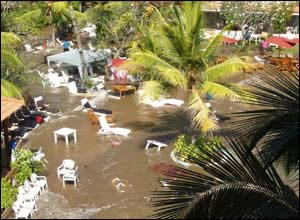 As a psychologist well versed in grieving and trauma, I cannot even comprehend the horror of having all one’s significant connections and all that really matters in life forcefully torn away all at once. All that is left is a mangled body with gaping wounds, bleeding and yet breathing. Gone are the familiar voices. Gone are the tender human touches. There is no one to talk to. There are no more tears, no more desires, and no more feelings. What remains is an endless, heavy, dark void that defies description. What is the meaning of it all?
As a psychologist well versed in grieving and trauma, I cannot even comprehend the horror of having all one’s significant connections and all that really matters in life forcefully torn away all at once. All that is left is a mangled body with gaping wounds, bleeding and yet breathing. Gone are the familiar voices. Gone are the tender human touches. There is no one to talk to. There are no more tears, no more desires, and no more feelings. What remains is an endless, heavy, dark void that defies description. What is the meaning of it all?
God, Tsunami and Suffering
Can we find God in the deadly tsunami? Is God still there, behind the veil of the darkness? Is the tsunami an act of an angry God? How can he allow such horror to happen to innocent people, especially the little children? What good can come out of this disaster? The tsunami disaster has ignited discussions around the globe regarding God’s existence and his culpability. Daily on TV, we hear pundits expounding their own brand of theology or pronouncing judgments on God. Newspaper editorials and magazine articles also show a great deal of interest in the topic of God and tsunami.
Like Job of the Bible, people from all faith traditions are crying out to their God for meaning and hope. Their faith is being put to a severe test, as they struggle to make sense of the horrendous tragedy. Many survivors may feel a profound sense of betrayal – the God whom they have worshipped faithfully has let them down; the ocean, which has provided bountifully, has now taken away their loved ones. Even fervent believers are wrestling with the problem posed by a disaster of such an unprecedented scale.
Dr. Rowan William, Archbishop of Canterbury, writes in the Telegraph: “The question, ‘How can you believe in a God who permits suffering on this scale?’ is therefore very much around at the moment, and it would be surprising if it weren’t – indeed it would be wrong if it weren’t.” However, he concludes that, in spite of such a terrible challenge to their faith, Christians must focus on “passionate engagement with the lives that are left.”
It is indeed understandable why all major religions try to make some sense of this mega-tragedy, which has shaken, if not shattered, the foundations of their beliefs. Even when religion cannot explain the mystery of suffering, it does shed some light on the big questions, and serves as a haven for healing. In spite of their feelings of moral and theological ambiguity, most believers would still resort to their religion for consolation and hope so that they can move forward.
The recent January 10 issue of Newsweek magazine ran an article with a powerful title: “Countless Souls Cry Out to God: After a cataclysm of Biblical proportions, people from faiths ask, Why us? Why here? Why now?” In this article, the author Kenneth Woodward outlines the responses from four major faith traditions most directly affected by the tragedy.
The Hindus Response
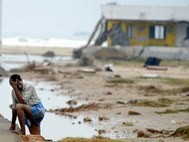 Those hardest hit by the tsunami were poor fishing communities whose inhabitants were mostly Hindus. Woodward writes: “For them, all of life is controlled by the play of capricious deities. Yet their religious world views and practices provide a measure of spiritual relief from the toil of their labor. Along the coast of south India, Hindus tend to worship local deities, most of them female and far down the Hindu hierarchy of divinities. But like Shiva and other classic gods and goddesses, these local deities are ambivalent: they have the power to destroy as well as to create.”
Those hardest hit by the tsunami were poor fishing communities whose inhabitants were mostly Hindus. Woodward writes: “For them, all of life is controlled by the play of capricious deities. Yet their religious world views and practices provide a measure of spiritual relief from the toil of their labor. Along the coast of south India, Hindus tend to worship local deities, most of them female and far down the Hindu hierarchy of divinities. But like Shiva and other classic gods and goddesses, these local deities are ambivalent: they have the power to destroy as well as to create.”
The tsunami and other disasters are generally viewed as destructive acts of gods, who need to be propitiated with offerings. Like the ancient Mayas in Mexico, they hedge their bets by worshipping all kinds of deities in order to avert disasters and secure divine blessings.
The Buddhist Response
The coastline of Thailand and Sri Lanka, two of the hardest-hit areas, is populated mostly by Buddhists. They attribute the disaster to karma – the law of cause and effect which operates at the individual, collective and even comic levels. At a deeper theological level, Buddhists are neither surprised nor troubled by the tsunami, because to the enlightened mind, life is full of suffering and events in the material world, both good and bad, are illusions.
For the living, their moral-religious responsibilities include: (a) They need to transfer some good merit to the deceased through offerings and a special ceremony performed by a monk, so that the deceased can have a better life in their next lifetime. (b) They need to follow the eight-fold path of gaining freedom of personal suffering. (c) They need to relieve the suffering of others through compassionate acts.
The Muslim Response
According to Qur’an, all events, including the destructive tsunami, are part of God’s plan, which is beyond human comprehension. Since Allah is merciful and compassionate, he must have some positive purpose in natural disasters. Therefore, most Muslims do not experience a crisis in their faith. They believe that the tsunami is God’s test of their faith and piety. Some Islamic clerics believe that the tsunami is both God’s punishment of the infidels and God’s warning to the faithful. Implicit in the warning is the assumption that the faithful could be spared from the disaster if they strictly obey Islamic laws and observe their religion.
The Christian Response
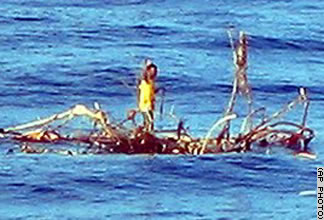 To the Christians, at least those who are biblically informed, suffering is to be expected. Christians believe that all evils, including the tsunami disasters, are the consequences of the Fall of mankind when Adam and Eve sinned against God by eating the forbidden fruit. They are familiar with the story of Job as an example of suffering of the innocent, and the narrative of Noah’s ark and flood as an example of God’s judgment. They also know Christ’s prophecy: “Nation will rise against nation, and kingdom against kingdom. There will be famines and earthquakes in various places. All these are the beginning of birth pains” (Matthew:24:7-8).
To the Christians, at least those who are biblically informed, suffering is to be expected. Christians believe that all evils, including the tsunami disasters, are the consequences of the Fall of mankind when Adam and Eve sinned against God by eating the forbidden fruit. They are familiar with the story of Job as an example of suffering of the innocent, and the narrative of Noah’s ark and flood as an example of God’s judgment. They also know Christ’s prophecy: “Nation will rise against nation, and kingdom against kingdom. There will be famines and earthquakes in various places. All these are the beginning of birth pains” (Matthew:24:7-8).
Central to their understanding is the example of Jesus, a man of sorrows, the sinless Son of God, who died a criminal’s cruel death on the cross, to provide redemption for sinners. The death of many innocent children during Christmas also reminds Christians of the first Christmas, when King Herod ordered the massacre of all the infant boys of Bethlehem in an attempt to thwart the rise of the “newborn king” (Matthew 2:1-18). When God made his presence known in the babe Jesus, God takes side with the oppressed and the helpless. Christ came to this world to suffer in solidarity with the sufferers in a broken world. Thus, acceptance of suffering is an integral part of the Biblical worldview.
The Christian path to coherence is a difficult one intellectually, not to mention the complexity of different theological perspectives. Still, it is a more promising approach than its alternatives. After pointing out that the rationalist atheist approach inevitably sinks to nihilism, Michael Novak concludes with a resounding affirmation of the compelling Christian response to the tragedy:
“Stand before the cross. Look at the body of this suffering servant of God. Look, perhaps, with eyes opened by Mel Gibson’s all but unendurable The Passion. If this is what God did His own Son – His own being, with Whom He is one – then what hope is there that we will be treated ‘nicely’? The God who does this is not ‘the God of niceness.’ His scale of grandeur is far different from ours. One has not sense of Him whatever if one does not feel inner trembling and vast distance…He made all the powers of storms, and all the immense force of earthquakes, and the roiling and tumultuous churning of the oceans. He imagined all the beautiful melodies we have ever heard, and more that we have not. God is God. God is our Judge. We are not His judge.”
Overcoming Tragedy through Faith
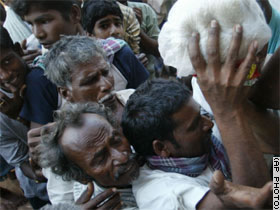 It is understandable that God takes the blame for evils not mediated by human agency. However, all major faith traditions, except for Hinduism, have come to accept natural disasters without compromising God’s character.
It is understandable that God takes the blame for evils not mediated by human agency. However, all major faith traditions, except for Hinduism, have come to accept natural disasters without compromising God’s character.
The very act of blaming God confirms that in spite of their shattered faith, they still believe that God exists and he hears their cries. The very fact of clinging to life in spite of all their pains confirms their faith in hope – tomorrow help will be arriving and life will be better.
The horror stories of loss continue to make their rounds, but so do the tales of miraculous survivals: A little boy was found alive on the hill alone with a blanket, a baby was found on a mattress floating on the water… “It is a miracle!” they would claim, praising their God. They were Hindus, Muslims, Buddhists, or Christians. A larger miracle is the outpouring of compassion and love from people of all ages and all ethnic-religious backgrounds. The tragedy has united people together like never before.
It takes faith to see beyond the tsunami tragedy and its devastating aftermath – millions of displaced survivors without adequate supply of water and food, miles after miles of wreckage and carnage, salt polluted wells and brine saturated farm lands, the threat of a second wave of death through water-carried diseases.
It takes faith to see beyond death and destruction to discover positive meaning and hope. When we place this tragedy in the context of the oldest human story – the story of how do humans survive all kinds of disasters and catastrophes, we begin to see rays of hope. Just like the earth renews itself after a ravaging forest fire, people too will rise from the ashes through faith.
The problem of suffering is not just a subject matter for intellection by the arm-chaired philosophers and theologians. On a practical and emotional level, suffering is simply an undeniable human condition, an existential given, to be confronted, embraced and transformed so that life can be elevated to a higher plane.
No matter how unpleasant and terrifying suffering may be, it is as essential to our spiritual well-being as pain is to our physical health. Suffering demonstrates God’s grace rather than his lack of love, because it is only through suffering that we are able to experience redemption and God’s faithfulness.
The book of Hebrew in the Bible provides a power definition of faith: “Faith is being sure of what we hope for and certain of what we do not see” (Hebrews 11:1). Different from the usual dictionary definition, which emphasizes faith as mental acceptance of a claim as truth without sufficient evidence, the biblical definition focuses on hope.
Faith in God – in his character and power – provides an unshakable foundation for hope, even when all our sensory data and human reasoning seem to contradict such hope. Genuine faith is immediately self-evidence by its humility, courage, endurance, kindness, and self-sacrificial love. In its purest essence, faith becomes love and hope and all many other virtues. By its very nature, faith in God will makes us more than conquerors.
The spirit of God is in the waters, the storms, and the tsunami ravaged land, the refugee camps and the first cry of the newborn babes. God speaks to us through the whirlwind, and through the still waters. God does not need us to defend him. Whenever you discover genuine faith, truth is never far away, and hope is sure to follow. Truth is never the loudest voice or the mightiest force; it is the humble path where the rubber hits the road.
On January 2, 2005, I went with my family to the Stone Church in Toronto to worship. My inner struggle with the tsunami disaster finally came to an end. My heart was reassured when we sang:
“All through the storm
Your love is the anchor
My hope is in your alone.”
Throughout the service, I experienced a wonderful sense of peace that passed understanding. When we were in God’s presence, all the chatters and noises simply vanished. God was there to minister to all those who were troubled, overburdened or downtrodden.
Pastor Don Noble confessed his own conflicting emotions: celebrating the New Year and the Lord’s Table, and at the same time feeling the sorrow and pain over the tsunami tragedy. Then he spoke softly but movingly on the topic of hope. Nothing can separate us from the love of God, he said, quoting from Romans 8:37-39. Not even disaster and death. We are more than conquerors through our Saviour Jesus Christ. Reading through several Scriptural passages, he reinforced the central concept that we need hope to survive, to overcome. There is a way to rise above, to get through. Hope is an internal awareness that suffering will come to an end, and there is remedy. God is always there. God can transform our lives and rewrite our destiny. He will change the way we think and feel about loss and tragedy. God is the God of hope, the God of fresh beginnings, and second chances. We need to invite hope into our souls and spirits.
My soul was also blessed by reading Psalm 62:5-8:
“Find rest, O my soul, in God alone; my hope comes from him. He alone is my rock and my salvation: he is my fortress, I will not be shaken. My salvation and my honor depend on God; he is my mighty rock, my refuge. Trust in him at all times, O people; pour out your hearts to him, for God is our refuge.”
What a blessed way to end my vacation! After the church service and arriving at the airport, my mind began to turn to the many urgent tasks awaiting me in BC, and the uncertainty of starting a new chapter, a new adventure in my life.
The inexorable passage of time tests the validity and strength of our faith: Can we trust God as our “might rock” in the midst of the tsunami in our lives? Do we have what it takes to set sail to an unknown and perilous future?
Epilogue
After returning from Toronto on January 3, I was down with a nasty flu. This is one of the reasons why I have not been able to complete my column on time. In this space, I have just shared with you my spiritual journey in the last two weeks; I still have much to say, but my body aches with fever, and persistent violent coughing and sneezing make it difficult for me to continue.
Let me simply conclude with a deep sense of gratitude to all my readers for your encouragement and support in the last two years. May your New Year be full of blessings and joyful services to a needy world!


 Meaning Conference 2025 will be the INPM’s first in-person conference with a virtual option after the pandemic.
Meaning Conference 2025 will be the INPM’s first in-person conference with a virtual option after the pandemic.